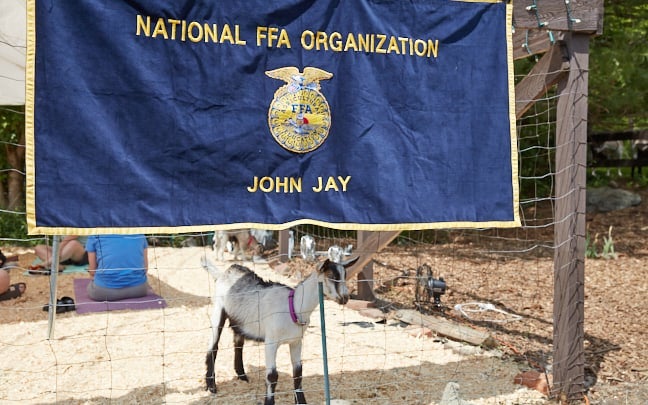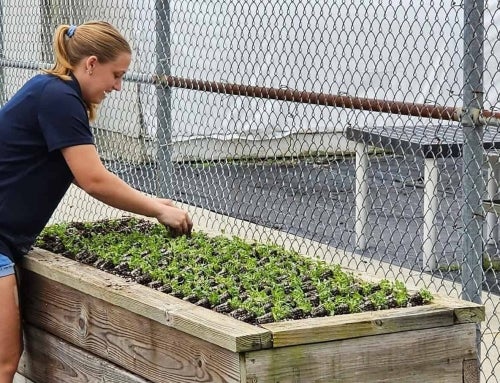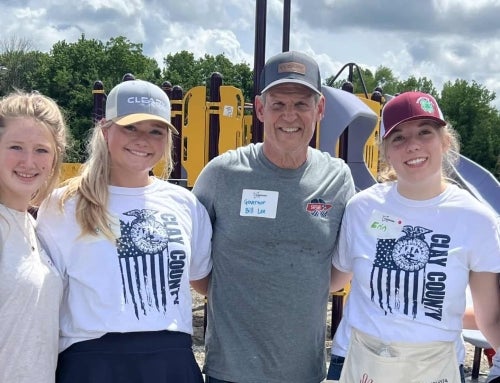Dutchess County in New York was a dairy farming hub – until tech giant IBM planted a massive campus there in 1962. Soon, 2 million square feet of buildings sprouted on 300 acres of former farm fields.
As people began to move north out of New York City in pursuit of jobs and a suburban lifestyle, the demographics of the community shifted. Parents encouraged children to become doctors, engineers or lawyers – not farmers.
In just two years, the newly established John Jay FFA Chapter has changed that perspective, and members also have become inspired by the opportunities in agriculture, even while living in a suburban setting.
Challenges of Starting a New Chapter

John Jay FFA Secretary Charlotte Bartush.
It wasn’t easy bringing agriculture education to John Jay Senior High School, which is part of the Wappingers Central School District. High school biology teacher Patrick Hancock led the decade-long crusade to connect students to agriculture in hopes of providing them with hands-on experiences. In 2009, he proposed raising a school garden and a few chickens. It was denied. He tried again and again with no success.
“Given the number of people with urban roots, farming had a stigma attached to it,” Hancock says.
In 2019, a change in school leadership allowed Hancock the chance to make another plea. When he finally got buy-in from a newly hired school administrator, he decided chartering an FFA chapter would offer a more comprehensive opportunity, introducing students to all facets of agriculture. Plus, the support from the national and state organizations provided the credibility to get approval.
The biggest hurdle was convincing the district administration and the board of education that FFA was more than a school club, according to Paul Albanese, assistant principal and advisory committee member for the chapter. Albanese, a New York City transplant, says the turning point was when advocates showcased the value of FFA; it’s a program that enhances a student’s education in various arenas, including science, business, public speaking and farming itself.
“Once everyone was informed [about FFA], networking began, then everyone came together to create a strong chapter from the ground up,” he says.
An agricultural education incentive grant co-funded by Cornell University and the New York State Department of Agriculture and Markets kick-started their efforts. The grant funded a high tunnel, or hoop house, behind the school for growing flowers and vegetables. Chapter activities quickly expanded into showing cattle, participating in Creed speaking and ag issues forum competitions, and creating a new animal science class.
An Agricultural Community Restored

John Jay FFA goat yoga attendees.
The local farming community embraced the chapter from the beginning. A beef farmer teaches members how to prepare to show beef cattle and provides access to animals for competition. An equine veterinarian with a herd of sheep hosts an intern to help with the lambing process and vaccinations and also to learn about overall herd health. Greenhouse owners and managers serve on the chapter advisory board, eager for members to jump into the horticulture field.
Charlotte Bartush, 2020-21 John Jay FFA secretary, didn’t come from a farm family and often felt her suburban community discouraged her from exploring jobs in the industry. FFA has given her the confidence to pursue an agricultural career.
“FFA has encouraged me to take the steps to further my agricultural involvement,” Bartush says. “I’m most passionate about dairy cattle, so I plan to go to State University of New York College of Agriculture and Technology at Cobleskill to explore careers related to that, whether it be marketing or tending to the livestock care. I’ve even considered becoming an ag teacher.”
FFA has provided John Jay FFA members with valuable experiences and led them down career paths they hadn’t previously considered.
“Before FFA, I had no idea what I wanted to do. I knew I liked animals and I had a small herd of Alpine dairy goats, but I never thought of a career in animal science,” says Lydia McDonough, 2020-21 chapter president. “Through FFA, I have shadowed a few vets and worked with all different types of animals, and I realized I had a passion. My current plan is to get a four-year animal science degree, then go on to vet school. FFA helped me realize the veterinary sciences were not too out of reach for me.”

Kerri Roger, math teacher at John Jay High School, was the yoga instructor.
“Our students are very fortunate to have access to these experiences,” says John Jay FFA co-advisor and biology teacher Mary Jane McFarland. “I have a former student at Cornell studying plants because of joining FFA last year, and several students are now considering other ag-related careers.”
Members have already created a buzz in the community. Although COVID-19 canceled many of their first-year activities in 2020, John Jay FFA members participated in District Creed and ag issues events, earning top placings in both.
“I have never been good with public speaking, but the senior Creed speaking event and agricultural issues event allowed me to become a better communicator, especially with a topic I am passionate about – advocating for agriculture,” Bartush says. She placed first at the district and substate levels in 2021.
Advocating in Unique Ways
Members are enthusiastic about sharing agriculture with suburban neighbors and find unique ways to engage with them. The chapter’s goat yoga fundraiser landed 300 attendees – some driving from other parts of the state and New Jersey to participate. The chapter took advantage of the growing trend of animal-based yoga sessions with the goal of educating people about farming. Additional event activities included milking demonstrations and opportunities for participants to bottlefeed a baby goat.
“We hope to use goat yoga as a community event where we can expose the younger generation to agriculture and make FFA more prominent in Dutchess County,” McDonough says.
McDonough’s mother suggested goat yoga after seeing videos on YouTube and exclaimed, “You have to do that as an FFA fundraiser.” The chapter launched a simple website for registration and promoted it daily during school announcements, through posts on social media and within the community. All four sessions for each of the five event days sold out weeks before the event. The event raised about $7,500 to go toward travel expenses for the next state competition.
“I’m overwhelmed with excitement,” McFarland says. “It was a great way for our community to know about John Jay FFA and what we have to offer. Seeing the excitement in the children’s eyes when they see, pet and bottle-feed the goats makes all the event planning so worth it. Who knows, an experience like this could initiate a career pathway in veterinary or animal science for some students of any age.”
All in for FFA

A goat yoga event attendee gets up close and personal with a friendly goat.
Mikayla LeClair, 2020-21 chapter sentinel, was nervous about joining FFA. She signed up on a whim after a friend suggested it. LeClair has cousins who raise chickens, goats and horses; she was already volunteering at a local environmental education center, teaching kids how to care for farm animals, grow gardens and learn about agriculture. She took the jump and joined FFA and says she is thankful she did.
“FFA has given me friends who have the same interests and made it possible for me to get more into agriculture, like learning how to milk cows at a dairy farm and how to show cattle,” LeClair says.
“I like being able to learn about agriculture in a way I never thought I could. Even though I will not be pursuing an agricultural major in college, I will continue to use the skills I have gained since joining FFA, and I am excited to see where our club will go in the future.”
For Sara Snowden, 2020-21 chapter treasurer, FFA rekindled her love for an industry she grew up in.
“When I was younger, I rode horses every day and showed dairy cows. Unfortunately, I had to give up that lifestyle when my dad passed away,” Snowden says. “FFA has given me the opportunity to revive the life I lived as a kid and gives me a sense of nostalgia.”
McFarland sees, through her students, that FFA provides endless opportunity. “FFA is like an onion. There are so many layers,” she says. “When we think we have a handle on things, we find more layers – all in a good way.”
Tips for Starting a New Chapter
-
- Consider this advice from John Jay FFA advisors Patrick Hancock and Mary Jane McFarland.
Don’t give up! Sometimes it’s a waiting game until the right leaders are in place and receptive to the idea. - Explain all the opportunities and careers FFA encompasses. Hancock and McFarland found that people thought FFA was limited to traditional farming. Once the suburban community understood that FFA prepares students for leadership roles and all aspects of agriculture and conservation, they were willing to embrace it.
- Start small. With so many options for getting involved, it can feel overwhelming. Hancock and McFarland focused on the Creed Speaking and Ag Issues competitions first, and they are adding additional activities one at a time.
- Connect with the state FFA office and other chapters in the region. All are willing to share insights and offer support.
- Consider this advice from John Jay FFA advisors Patrick Hancock and Mary Jane McFarland.
For more information about the Agricultural Issues Forum Leadership Development Event (LDE), visit FFA.org/Agricultural-Issues-Forum. To learn more about how to start a chapter in your area, visit FFA.org/Start-An-FFA-Chapter.












